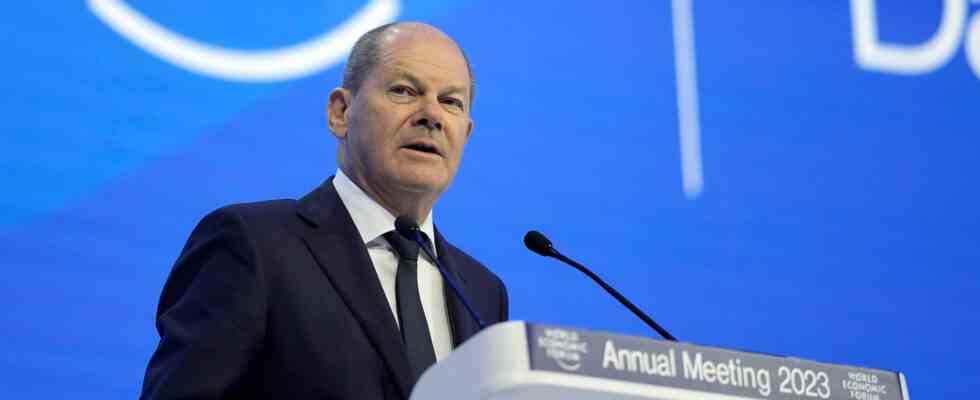As of: 01/18/2023 4:56 p.m
In Davos, Chancellor Scholz promised Ukraine “unlimited German support”. However, Scholz did not comment on a possible delivery of “Leopard” tanks. His speech was primarily about one thing: the economy of the future.
“What a difference a year makes” – with these words Federal Chancellor Olaf Scholz (SPD) opened his speech at the World Economic Forum in Davos. The Chancellor then outlined the changes in the global economy – also as a result of Russia’s war in Ukraine.
Support for Ukraine “as long as necessary”
Once again the Chancellor made it clear: “We will continue to support Ukraine – for as long as necessary”. To ensure that Russia’s war of aggression fails, Germany is “continuously supplying” and in close consultation with international partners “large quantities of weapons,” emphasized the Chancellor. Scholz referred, among other things, to the delivery of the “Patriot” air defense system promised by the federal government.
Chancellor Olaf Scholz pledges further help to Ukraine
tagesschau24 4 p.m., 18.1.2023
In his speech, which was held in English, he described the military aid that has been provided and promised to Ukraine to date as a “profound turning point in German foreign and security policy.” Russia has already failed with its imperialist war goals, said Scholz.
No word on “Leopard” tanks
The Chancellor did not respond to the question of the possible delivery of German “Leopard” main battle tanks, which was the subject of heated debate in the traffic light coalition and in which Germany is also under growing international pressure.
So far, Scholz has spoken out against the delivery of battle tanks, arguing that Germany should not go it alone. In the meantime, however, Poland and other EU and NATO countries want to supply their own “Leopard” tanks to the Ukraine and are pushing for the necessary approval from the manufacturing country Germany. Great Britain has already announced that it will deliver heavy main battle tanks from its own stocks to Ukraine.
Scholz’ main topic – the economy of the future
In addition to Ukraine, the Chancellor also spoke about the economy of the future. Scholz said that the transformation towards a climate-neutral economy was experiencing a “new dynamic”, not least because of the war in Ukraine. Nevertheless, the Chancellor affirmed that the future belongs to renewable energies – also in Germany. Scholz referred to the second German LNG terminal, which was inaugurated on Saturday.
Scholz also stated that Europe should be the first zero-emission continent by 2050. And Germany is also in the process of changing in this direction. As a declared goal, Scholz confirmed that Germany wants to be climate-neutral by 2045. Scholz also tried to allay fears that the war would mean a renaissance of coal and oil.
Free trade and still climate protection
Scholz also campaigned for free trade with his speech. He will do his utmost to ensure that the EU concludes free trade agreements with India, the South American Mercosur countries and Indonesia. In order to achieve fairness in the competition between the countries with different climate protection efforts, the EU must have a border adjustment mechanism, emphasized Scholz. This could then have import duties for products from countries without expensive climate protection regulations.
Rainald Becker, SWR, currently Davos/Switzerland, on today’s speech by Chancellor Scholz at the World Economic Forum in Davos
tagesschau24 4 p.m., 18.1.2023
Scholz emphasized again that he welcomes the US subsidies for climate-friendly investments. However, these should not put European industry at a disadvantage. “Protectionism prevents competition and innovation and harms climate protection,” he warned.
Expand subsidies for key technologies in the EU
At the same time, Europeans would have to expand their subsidies for key technologies, especially in the digital and climate sectors. Scholz expressly contradicted demands for a new EU pot for investments worth billions. “The funds are available: only 20 percent of the more than 700 billion euros in the European recovery fund have been paid out,” he warned. EU state aid law must become more flexible.

